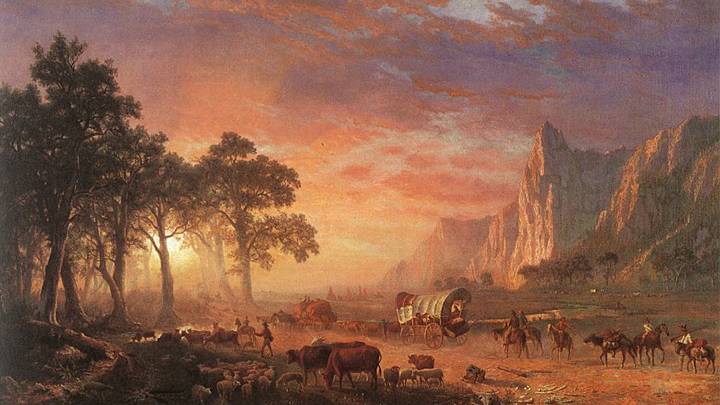
The Mellema Program in Western American Studies was endowed by Dirk and JoAnn Mellema in 1993. Calvin University hired William Katerberg as its director in 1999. The program is housed in the historical studies department but is an interdisciplinary program with interests across academic fields and cultural activities. The program defines “Western American” as US territory west of the Mississippi River and includes comparative study of the Canadian West, Northern Mexico, Alaska, and Hawaii and the region’s relations with the larger Pacific Rim.
Learn More about the Mellema Program
The Mellema Program sponsors three history courses that are taught regularly by the director or other history faculty. HIST 358 is an advanced topics course that in the past has focused on comparative frontiers and on the history of violence and power in the American West. Currently, it is being taught as “Climate and sustainability in the American West. HIST 274, "Environmental History," surveys the history from early humanity to the present, including a significant regional component on the American West. HIST 250 covers "Native American History” from the arrival of the ancestors of modern Native Americans at the end of the last Ice Age to the present, with a special emphasis on the American West and comparisons to Indigenous peoples in other parts of the World.
The Mellema Program also has sponsored the development of courses in other departments with significant components related to the American West. These have ranged over the years from English to Geology and Environmental Studies and has included off-campus courses in the American West.
The Mellema Program annually awards grants to Calvin University faculty for research or course development on topics related to the American West. It typically calls for grant applications in January and makes awards in March or April.
The program has awarded research grants to faculty in disciplines ranging from history to English literature, religion, geology, environmental studies, biology, photography, and dance. Projects have included topics related to violence in the American West; water rights in the region; fish fossils in Oregon and California; hockey in Western Canada and Minnesota, and dance and mask making in Alutiiq/Sugpiaq communities in Alaska. It has awarded grants for to support the development or revisions of courses related to the American West in a wide variety of disciplines, for both on-campus and off-campus courses.
For more information about faculty development grants, detailed examples of grants, and the application process go to the Mellema Program research and course development grants page.
Calvin University's library now holds one of the largest collections of Western American studies material in Michigan. In addition to recent scholarship on the American West, the library includes a significant amount of work on the Canadian West and North. It also includes runs of major journals that focus on the West, notably the Western History Quarterly, Pacific Historical Review, Journal of the West, and Montana: Magazine of Western History.
The library is also rich in primary sources from the eighteenth, nineteenth, and twentieth centuries, notably significant portions of material from microfilm and digital collections such as Western Americana, History of the Pacific Northwest, The Plains and Rockies, Travels in the West and Southwest, History of the Canadian Northwest, Mountain West Digital Library, Indian Peoples of the Northern Great Plains, Princeton Collections of the American West, American West (Newberry Library), Indigenous Histories and Cultures in North America, and Indigenous Newspapers in North America. Descriptions of this material on microfilm and in digital collections can be found at the library website.
In 1993, Dirk and JoAnn Mellema provided a generous donation to establish a Western American Studies Program (MPWAS) at Calvin University in the history department. The purpose of the MPWAS is to promote the study of the culture, land, and history of the Western U.S. The program promotes teaching and research related to the West as well as public lectures and cultural events that serve the larger West Michigan and Calvin University communities.
The first phase of the program, organized by the then historical department chair and acting director James Bratt, begin in 1995–1996. It included library enhancement, course development, and an inaugural conference.
Library enhancement began with the purchase of several hundred books, full runs of five scholarly journals, microform collections containing some 1,500 nineteenth century primary sources, and three video series related to the American West. Early course development grants funded courses in natural resources and westward expansion and Western American literature.
The inaugural Mellema Program conference was held in 1997 and included lectures by prominent historians of the American West as well as seminars for Calvin University alumni social science teachers working in Western states. The conference also familiarized the larger college community with the subject and promise of the new program. Developments in 1997–1998 expanded the program to include the Canadian West and Northern Mexico, providing MPWAS with a distinctive identity in the field and reflecting Calvin University’s historic Canadian connection.
In 1998–1999, Calvin University conducted a search for a permanent director who would promote Western American studies across the disciplines, an American cultural historian who could develop an ongoing program of research in the North American West and encourage Christian perspectives on Western American cultural studies. In February 1999, it hired William Katerberg to direct the MPWAS and teach in the historical studies department. He has been the director of Mellema since 2000.
MPWAS has continued to fund and host annual Mellema lectures; provide grants for research and course development by faculty in departments such as history, literature, religion, and geology; and purchase library materials, including significant microform collections of primary sources. Calvin University’s library now holds the largest collection of Western American studies material in Michigan. The Mellema Program also has helped to sponsor academic lectures in a variety of departments and cultural events ranging from concerts, film series, readings by writers, and dance recitals.
Publications
Mellema Program in Western American Studies grants have supported a variety of book programs. Click the book titles below to learn more.












